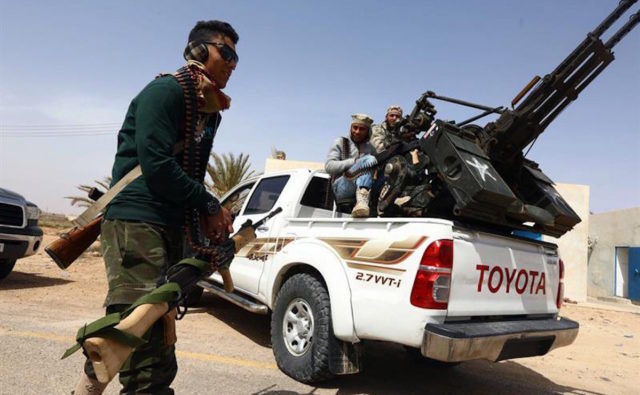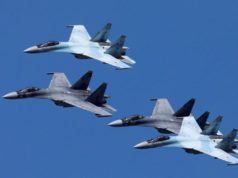
Fighters loyal to Libya’s new unity government captured Abu Grain and two other villages Wednesday, as they push to retake Sirte from Islamic State. The military offensive comes shortly after the Obama administration announced plans to arm forces loyal to the U.N.-backed government.
Militiamen based in Mistra faced Islamic State truck bombs, booby traps, and small arms fire as they advanced eastward toward Sirte along the main coastal highway. Abu Grain and two other villages on the route between Misrata and Sirte were also “liberated,” according to a televised statement from a government spokesman. Seven government loyalists were killed in the fighting and 19 others were wounded.
Meanwhile this week, the Obama administration announced a plan to lift parts the UN arms embargo on Libya and provide weapons to the internationally recognized unity government based in Tripoli, known as the President’s Council. Secretary of State John Kerry led a meeting of 19 countries, including the four other permanent UN Security Council members, culminating in an agreement to “respond to the Libyan government’s requests for training and equipping” soldiers against Islamic State. Top U.S. officials estimate the country is currently home to 6,000 Islamic State fighters.
With international cover for arming the Libyan government, the White House will be free to deepen its involvement in the country. President Obama has instructed the Pentagon to deploy Special Operations teams on the ground in an effort to vet local groups that could receive U.S. support for helping the nominal government. However, providing weapons to militias could have unintended consequences as the unity government has not been fully consolidated militarily. Selective arming of rival groups that until recently fought each other, could upset the balance of power that enabled the unity government. The “National Army” faction lead by Gen. Khalifa Haftar and based in Tobruk still refuses to integrate its troops into a unified command with the President’s Council. Haftar still has considerable military clout and has exploited Libya’s “chaos to gain political and financial power,” according to a recent op-ed in the Washington Times. Therefore, arming rival factions could inhibit the further political integration Libya’s desperately needs.
Ultimately, the Obama administration may be hard-pressed to find a force interested waging a war for the West’s benefit amid Libya’s ongoing political turmoil.





